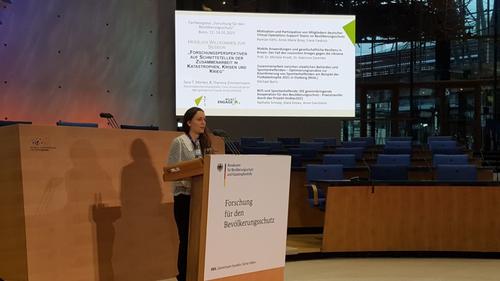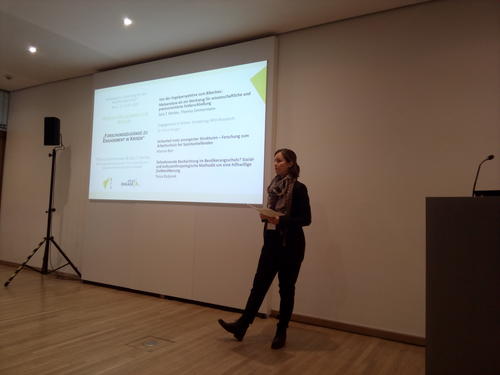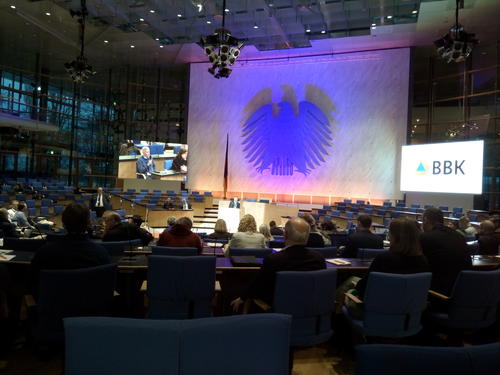The ATLAS-ENGAGE project at the BBK Congress on Research for Populaton Protection
BBK-Fachkongress „Forschung für den Bevölkerungsschutz“
BBK-Fachkongress „Forschung für den Bevölkerungsschutz“
BBK-Fachkongress „Forschung für den Bevölkerungsschutz“
News from Jan 31, 2023
The ATLAS-ENGAGE project was represented with several contributions at the BBK Congress on Research for Population Protection in Bonn, which took place for the first time from 12-14 January 2023. Sara Merkes and Theresa Zimmermann organized two sessions discussing research on volunetering in crises and also gave two presentations reflecting on the methodology used in the project:
- In the session "Research Perspectives on Interfaces of Collaboration in Disasters, Crises and War," four presentations addressed collaboration in crises, interfaces between actors and technologies, and translation needs of information and knowledge. The presentations addressed motivational structures and participation forms of digital engagement in the context of VOSTs, the role and use of mobile applications and communication channels in crisis management, collaboration between government agencies and spontaneous responders, and ways to transfer relevant research findings into practice. The session included the following contributions on interconnected volunteerism in population protection:
- Motivation und Partizipation von Mitgliedern deutscher Virtual Operations Support Teams im Bevölkerungsschutz, Ramian Fathi, Anne-Marie Brixy, Frank Fiedrich
- Mobile Anwendungen und gesellschaftliche Resilienz in Krisen: Der Fall des russischen Krieges gegen die Ukraine, Prof. Dr. Michèle Knodt, Dr. Kateryna Zarembo
- Zusammenarbeit zwischen staatlichen Behörden und Spontanhelfenden – Optimierungsansätze zur Koordinierung von Spontanhelfenden am Beispiel der Flutkatastrophe 2021 in Stolberg (Rhld.), Michael Bartz
- BOS und Spontanhelfende: DIE gewinnbringende Kooperation für den Bevölkerungsschutz - Praxistransfer durch das Projekt HoWas2021, Nathalie Schopp, Klara Drews, Anne Eversheim
- In the session "Research Approaches to Engagement in Crises," four presentations critically examined research on engagement in the context of civil protection. After a meta-analytical perspective on research on crisis- and disaster-related engagement (see below), a research paper on labor- and security-related aspects in volunteerism was presented. Potentials of social and cultural anthropology for engagement-related research in population protection were then discussed. Finally, blind spots around gender-sensitive research approaches were pointed out. The session included the following contributions on different methodological, conceptual and theoretical research approaches to engagement in population protection:
- Von der Vogelperspektive zum Biberbau: Metaanalyse als ein Werkzeug für wissenschaftliche und praxisorientierte Felderschließung, Sara T. Merkes, Theresa Zimmermann
- Engagement in Krisen: Gendering NPO-Research, Dr. Petra Krüger (Vortragszusammenfassung durch Session-Moderation)
- Sicherheit trotz emergenter Strukturen – Forschung zum Arbeitsschutz bei Spontanhelfenden, Marina Bier
- Teilnehmende Beobachtung im Bevölkerungsschutz? Sozial- und kulturanthropologische Methodik um eine hilfswillige Zivilbevölkerung, Tessa Bodynek
- In the presentation "From Bird's Eye View to Beaver's Burrow: Meta-Analysis as a Tool for Scientific and Practice-Oriented Field Exploration" Sara T. Merkes and Theresa Zimmermann discussed the potentials and limitations of a qualitative meta-analytical approach for scientific and practice-oriented field development. Based on the meta-analysis of research and practice approaches conducted in the research project ATLAS-ENGAGE, they presented results on volunteerism in population protection and different manifestations of participation in crises and disasters and reflected on them along their methodological genesis.
- In the presentation "Researching into the Future: Limitations and Potentials of Scientific Engagement with Societal Developments and corresponding Conclusions for Population Protection", Theresa Zimmermann and Sara Merkes reflected on the possibilities and challenges of futures research methods for the analysis of future trends in population protection. The presentation was based on results from the ATLAS-ENGAGE project, in which comprehensive research and a structured content analysis were used to discuss the effects of societal (mega-)trends on hazard and operational situations as well as the forms of voluntary engagement underlying civil protection.
You can find the entire program of the congress here.
The conference ended with another highlight, namely a visit to the federal Supplementary Equipment in Bonn-Dransdorf.


